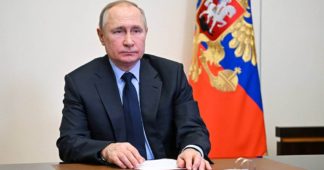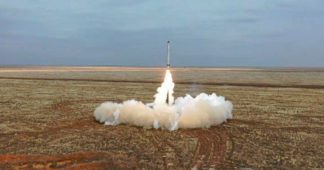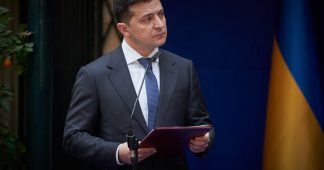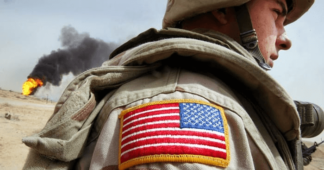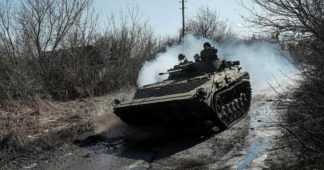ST. PETERSBURG, June 18. /TASS/. Russia does not mind Ukraine’s accession to the European Union, but is not ready to forget the 2014 state coup in the country, Russian President Vladimir Putin said, answering to questions during the St. Petersburg International Economic Forum’s plenary session on Friday.
The Russian leader explained why the Russian forces do not storm Ukrainian defense lines near Donetsk, but was tight-lipped on the question about red lines whose violation will entail strikes at Ukraine’s “decision-making centers.” He also explained that Russia would be producing “hemp and saddles” if it loses its sovereignty. In his opinion, army and fleet will remain the only security guarantors for Russia.
TASS has gathered Putin’s answers to various important questions.
On sovereignty
“Always, when making any decision, you need to identify the main thing. What is the main thing for us? To be independent, sovereign and ensure development for the future, now and for future generations. If we do not have sovereignty, then in the near future we will have to buy everything and we will produce only oil, gas, hemp, saddles.”
On Western goods
Russia will learn to produce goods that are now disappearing from the market as a result of Western sanctions. “They will continue to sell to us packaging and other such things, even telephones and smartphone. But they have never shared and will never share critically important technologies with us.”
According to Putin, many Western companies, at least from European countries, will return to the Russian market and “will be happy to work here.” “I have no doubts about this. Life will make them just do it. And we will not prevent them from doing this, we are open to the whole world.”
Western sanctions
“It is pretty clear that the blitzkrieg against our economy has failed. As Mark Twain once remarked, ‘”The report of my death was an exaggeration’,” Putin said.
The Russian president pointed out that European politicians had dealt their economies a severe blow with their own hands. Western sanctions are having a serious negative effect on the global situation, primarily on the food market. “European politicians have landed a heavy blow on their economies. They did it themselves, with their own hands,” Putin concluded
On Ukraine
Russia does not mind Ukraine’s accession to the European Union: “The EU is not a miliary organization or a military-political bloc, in contrast to NATO. We have always said, and I have always said that our stance is very consistent and clear in his respect: we have nothing against.”
However, in this case Ukraine risks becoming a ‘semi-colony’ of the West: “It is unlikely that this [EU membership] will lead to the restoration of the lost aircraft industry, shipbuilding, the electronics industry and other critical industries. It is unlikely because the European “greats” will not create competitors for themselves.”
At the same time, Putin criticized the notion that Ukraine’s political elites had made a “civilizational choice” in favor of the West: ” What <…> civilizational choice are you talking about? They stole money from the Ukrainian people, hid it in banks and want to protect it. Here’s the best way to protect it: It’s to say that this is a ‘civilizational choice.’ They started to engage in anti-Russian policies in the hopes that whatever they do, their money will be protected there. And that’s, of course, what, in fact, is happening. Whatever they do, they get away with it. That’s the whole point of the ‘civilizational choice.’”
About military operation
Armed hostilities are always a tragedy, but the special military operation in Ukraine was a forced move. “We were simply pushed toward that line.”
Storming Ukrainian strongholds near Donetsk created eight years ago is inexpedient and efforts are underway to overtake them from the rear, Putin said. “This is because this will lead to large casualties among the attacking forces,” he explained. Systemic work is underway to overtake these strongholds from the rear. “This, of course, will require certain time. Counter-battery fighting is ongoing there,” Putin stressed, adding that the Russian forces had “a huge advantage” in artillery. “We talk about conducting a special military operation and even in this special military operation we must not turn those cities and populated localities that we are liberating into something like Stalingrad.”
Putin preferred to keep quiet when asked about the red lines beyond which strikes against decision-making centers in Ukraine might follow. “As for the red lines are concerned, I will prefer to keep it to myself, because on our side this would imply rather harsh actions against the decision-making centers that I was talking about that you have mentioned.”
On past and future relations with Kiev
Russia will never agree to forget about the bloody state coup in Ukraine in 2014 as it is the root of today’s problems. At the same time, Putin believes that relations between Moscow and Kiev will eventually return to normal. ‘We assume that the situation will normalize sooner or later, and we want all our neighbors to flourish. And then <…> ties will be inevitably restored.”
Recognition and future of Donbass
Russia had every right to recognize the Donbass republics under the UN Charter, in accordance with the Kosovo precedent, and will keep defending interests of Donbass residents. “When Kosovo declared independence, the International Court of Justice, pressured by Western countries, ruled that under the UN Charter, when a country declared independence, there was no need to seek permission from the central government,” Putin said, adding that a precedent had been set then. “It means that the Donbass republics did not have to ask Kiev for permission.”
The region’s future depends solely on its residents: “We will treat their every choice with respect,” he said.
Meanwhile, President of Kazakhstan Kassym-Jomart Tokayev, who was also present at the session, said his country regards the Donetsk and Lugansk people’s republics as quasi states and is unlikely to recognize their independence.
On relations with Kazakhstan
“We have allied relations with Kazakhstan. One might say, fraternal ones. We are members of the same defense bloc – the CSTO. Also, we are members of the same economic organization. Will it ever occur to anybody in Russia to spoil relations with Kazakhstan on any issues? This is nonsense. We are interested in strengthening such relations.”
On nuclear threat and security guarantees
When asked at the St. Petersburg International Economic Forum to comment on the West’s allegations about the threat of a nuclear war and the Third World War, the Russian leader noted that Moscow “hears such rhetoric.”
“Where does it come from? From their own statements. Now and then irresponsible politicians would blurt out something like that, even high-ranking politicians – say, at the level of foreign ministries, the leaders are ranting and raving about it. Are we supposed to stay silent? We are responding correspondingly. As soon as we respond, they would pick on our words and say: look, Russia is threatening us. We are not threatening anyone, but everyone should know what we have and what we will use to defend our sovereignty. These are obvious things.”
Moscow is ready to build relations with all countries, despite of what is happening today, but it will take care about its security on its own: “Solely the Army and the Fleet can be a guarantee of our security.”
On those who are ashamed of being Russian
“Some people say they are ashamed of being from Russia. You know, those ashamed are the people who do not link their own future and life, as well as the future and lives of their children, with our country. They are not ashamed, they are afraid of having problems in regions where they want to live and want their children to live.”
On optimism in global politics
Putin hopes that the situation in global affairs would finally calm down: “We are not happy that some countries may face any negative consequences. We don’t want it. We hope that common sense will ultimately win the upper hand and the situation in global affairs will finally calm down and everyone will respect each other’s interests, and we will be able to operate normally.”
He pointed to a growing controversy in the United States. “If [US] policies remain the same, it will keep growing,” Putin said, adding that he had “great respect for the American people.”
“At the end of the day, relations will become what they should in these countries, in the United States and on the international stage. I am more of an optimist than a pessimist.”.
We remind our readers that publication of articles on our site does not mean that we agree with what is written. Our policy is to publish anything which we consider of interest, so as to assist our readers in forming their opinions. Sometimes we even publish articles with which we totally disagree, since we believe it is important for our readers to be informed on as wide a spectrum of views as possible.
